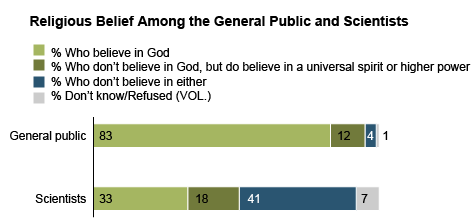- Jul 18, 2018
- 2,575
- 1,142
- Country
- United States
- Faith
- Skeptic
- Marital Status
- Married
Members of the National Academy of Science are far more likely to withhold belief in the supernatural than the general population. Science majors in general lack belief more than the general population.
Biblical and New Testament scholars do not often hold conservative theological beliefs such as inerrancy. This often impacts scholarly views of the miraculous claims of the Bible and its broader supernatural claims. If a deeper analysis of the text leads to the liberalization of theological belief or secularity, should Christians pursue doctoral degrees in biblical scholarship?
According to this data trend, should conservative Christians pursue advanced degrees (Masters and Doctorates)?
Biblical and New Testament scholars do not often hold conservative theological beliefs such as inerrancy. This often impacts scholarly views of the miraculous claims of the Bible and its broader supernatural claims. If a deeper analysis of the text leads to the liberalization of theological belief or secularity, should Christians pursue doctoral degrees in biblical scholarship?
According to this data trend, should conservative Christians pursue advanced degrees (Masters and Doctorates)?
Last edited:

